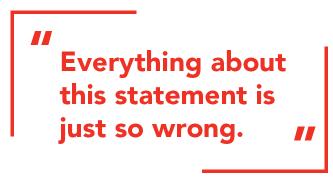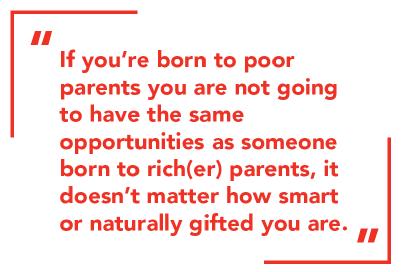Why is it wrong to ‘just’ talk about diversity?

I am no fan of Lewis Hamilton (due to my Ferrari allegiances), but developed immense respect for him on a personal level when I read about a conversation between Lewis and Toto Wolff (Mercedes Formula 1 boss):
“He (Lewis) once asked (Toto) me: ‘Have you had the active thought that you are white?’ I said: ‘No, I have never thought about it,’ and he said: ‘I need to think about it [my colour] every day because I am being made aware of it.’
As a six-time world champion, Lewis has achieved almost everything there is in the sport. If he is made aware of his colour, every day, imagine what others less privileged than he, feel like or are made to feel like every day. A lot has been said in recent years and (more so) in recent months about diversity; but the question remains, why are under-represented sections of society still forced to deal with the effects of under-representation every day of their lives?
Unfortunately, we live in a society that talks the talk about diversity but rarely walks the walk. Most conversations around diversity have a siloed approach. As a society living in the 21st century, we should be ashamed that we need a campaign like #BlackLivesMatter when by now we should actually have established that Black lives must matter just as much as White lives and all other lives. No one should have to fight to get what is rightfully theirs.
Given that we live in a society which has failed us, symbolism, role models and diversity champions are needed to raise awareness. However, championing diversity without creating a meritocratic environment will reduce that championing to a token gesture and a tick-box exercise, something most organisations are conveniently doing already.
Awards: A Polarising Subject
I volunteer some of my time for an engineering charity. Back in 2014, I floated the idea of a “woman engineer of the year award” to celebrate woman engineers who have reached great heights in their careers despite the societal and organisational hurdles and stereotypes they might have experienced. For me, awards not only recognise contributions but also create role models.

I was a bit naive in thinking that setting up of the award would be a no-brainer for the organisation’s awards committee. Little did I know that a bunch of white men (‘the awards committee’) sitting in a room in central London would decide that creating an award to celebrate women engineers would be discriminatory!

This is even when I got a major British engineering giant to sponsor the award, so money wasn’t even an issue! To my surprise, the more I spoke to engineers (of all genders) in the UK and internationally, the more I realised that this is a polarising topic. Some of the white woman engineers were passionately against the idea of this award. To be fair, they have been fortunate enough to be brought up in families and organisations where bias was limited and people progressed on merit. But my biggest issue with them is that they wrongly (and perhaps naively) assumed that everyone else has been as fortunate as them.
This was six years ago, and to date, the organisation doesn’t have and doesn’t want to have an award for woman engineers!
The Flawed Argument
I was following the recent uproar on Twitter against the Institute of Physics (IoP) following an ignorant blog post by their Chief Executive and the lack of diversity in their honours and awards. I don’t belong to the institute and neither am I familiar with their way of working. But one statement from that blogpost jumped out for me: “nominate more people from under-represented groups for awards”.
At the face of it, the statement makes perfect sense and yes the responsibility lies with us. But let me give you another fact. A recent study on bias in science, of over 1.2 million PhD recipients found that ‘underrepresented groups have to innovate at higher levels to have similar levels of career success’.
Nominating more people from underrepresented groups wouldn’t help when the bar for giving them recognition is much higher than their peers. Isn’t this blatant discrimination? Just having more nominations will become a hollow act and sooner rather than later, people will not be motivated enough. This is an issue with our entire academic world, corporate world and society in general.
Applying Systems Engineering
Just speaking about diversity is a reactive approach to decades of the wrongdoings of bias. While I absolutely believe that we need to be vocal and promote diversity in our teams, organisations and society, the potential impact of all our work could be far-reaching if we are able to create a culture of meritocracy. Recognising people for their contribution (irrespective of their skin colour or race, religion, gender etc.) can be immensely empowering and motivating.
One big thing I have learnt in my career applying systems engineering is that context (by which I mean the environment in which something happens), is important. Actually, context is everything! A command from a controller or a piece of faulty code may be safe or hazardous depending on the context in which they are exposed.
Similarly, circumstances under which individuals’ contributions and achievements were made need to be contextualised. When I say, judge the person on merit, I include their journey towards their achievements (equality is not the same as equity). If we consider just “what” has been achieved, it means we are assuming that everyone in the society has had equal opportunities. And in our current societal setup, I would really like to meet any person who can guarantee that!

There is a need for those at the top of organisations to foster a truly meritocratic environment, and for those within the organisation to celebrate and embrace diversity and create role models. Unless we have this combined approach, there will always remain a glass ceiling for the under-represented and we would have failed to deliver as a society.
Should meritocracy be chosen over diversity?
Truth is I don’t know the answer. However, I believe it’s the trait of a great leader to be able to contextualise the merit (laid on paper) with the fight an individual has had to endure to achieve it, to level up the playing field.
A recent TED post on qualities of an effective team player mentioned hunger as one of the three qualities (the other two being humility and emotional smartness). A few months back, I was speaking with a friend of mine who had to fight throughout her life (due to our societal bias and prejudices), but now that fighting spirit and the drive she has, is her biggest strength. So much so that she wants her son to also undergo some level of hardship to develop that inherent hunger and self-motivation. And I completely agree with her as too much lip service is being made in the name of diversity without creating a meritocratic environment for people to grow or get recognition.
In times to come, our biggest achievement as a society would be if we have created a society where everyone has had equal opportunities and we don’t have to make this decision of meritocracy over diversity or vice versa. Diversity will then be a by-product of meritocracy. However, until then, we need to ensure that we create and celebrate role models who have cut through the hypocrisy of our society and achieved due to their hunger and desire.
An appeal to the research community and industry
When we evaluate applications (be it for awards, research funding, and recruitment), we need to evaluate them in the context of the society we live in and the obstacles the applicants have had to overcome. The academic world is especially poor at this. Unfortunately, the ‘system’ doesn’t really allow for considering what people have experienced. However, the UKRI Future Leaders Fellowships is a scheme which I think does that as it is so focussed on the individuals. And I am not just saying that as a chosen fellow. I still vividly remember a UKRI FLF video (from last year) from Professor Fiona Watt (Executive Chair, Medical Research Council), saying this scheme is for “people who don’t fit neatly into boxes!” Never before, have I heard something like this in an academic world. Kudos to UKRI for creating such a programme.
Before making a decision on applications, just imagine what they could achieve if they were given the same resources and infrastructure (because of their fighting spirit) … If we do this, the number of awardees/lecturers etc. from under-represented sections of the society would increase dramatically, which in turn would inspire many others. However, this is a short term measure.
In the long term, we need to take both a top-down and bottom-up approach to get over the decades-long wrong of ‘biases’. Recognising that the playing field is uneven and that we are not all coming from the same starting point and appreciating this in our decision making would be a major step forward. I hope we can create research and organisational culture which has its foundations on meritocracy enabling diversity.
It is a marathon and we need a few 100m sprints wins to keep our spirits high to drive the long-term commitment to a holistic approach….
................
I must admit, I wasn’t sure how this blog will be received. I was so worried (borderline scared) that I reached out to a few of my friends and colleagues to get their opinion to gauge if I should even publish it. Big thank you to Professor Paul Jennings (WMG), Dr Poonam Goyal (my wife), Corrina Urquhart (WMG), Dr Izzy Jayasinghe (UKRI Future Leader Fellow, University of Sheffield), David Webb (CCAV, HM Government), Michaela Hodges (WMG), Jennie Martin (ITS UK), Nicola Jennings (University of Bath), Luke Logan (BAE Systems), and Dr David Bott (WMG) for their feedback on this blog.
I am an Indian national and a bit outspoken (especially on matters I deeply care), and have been told that if I do the right thing, I would have a good night’s sleep (however long or short it might be!).
This blog represents my personal opinion and not that of my employer or any organisation I am (even remotely) associated with.
**Original article written by Siddartha Khastgir, published to Medium here.
